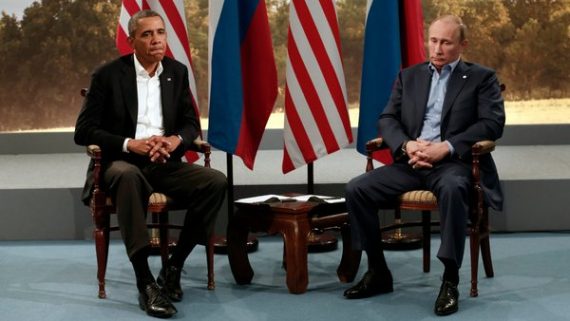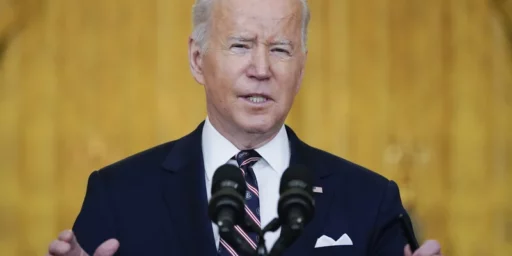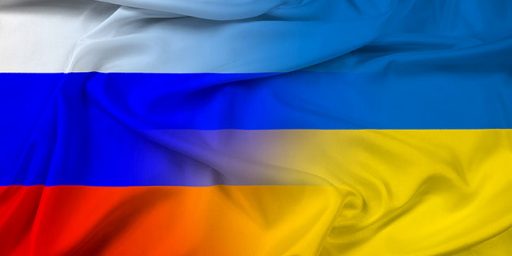Putin Refusing To Talk To Obama About Ukraine
It appears what we've got here is a failure to communicate.
The United States and Russia apparently aren’t on speaking terms right now, at least not when it comes to Ukraine:
Since the invasion of Crimea, President Vladimir Putin and President Barack Obama have had regular phone calls in an often half-hearted attempt to deescalate the ongoing crisis inside Ukraine. But as the U.S. and EU prepare to unveil new sanctions against Russia, Putin has decided the interactions should stop. The Kremlin has ended high-level contact with the Obama administration, according to diplomatic officials and sources close to the Russian leadership. The move signals an end to the diplomacy, for now.
“Putin will not talk to Obama under pressure,” said Igor Yurgens, Chairman of the Institute for Contemporary Development, a prominent Moscow think tank, and a close associate of Russian Prime Minister Dmitry Medvedev. “It does not mean forever.”
Obama and Putin last spoke over the phone on April 14, a call that the White House said was initiated at Moscow’s request. Obama urged Putin in the call to end Kremlin support for armed, pro-Russian activists creating unrest in eastern Ukraine. Obama also warned that the U.S. would impose more “costs” on Russia if Putin continued his current course. According to the Kremlin’s readout of the call, Putin denied Russian interference in eastern Ukraine and said “that such speculations are based on inaccurate information.”
Obama and Putin have spoken to each other about Ukraine regularly over the past weeks, including calls on March 28, March 16, and March 6. But that these calls are now on hold for the indefinite future, due to their lack of progress and frustration on both sides.
President Obama isn’t the only American official having a hard time getting hold of his counterpart in Russia:
Other top U.S. officials are also now out of direct contact with their Russian interlocutors. Defense Secretary Chuck Hagel is also getting the cold shoulder from his Russian counterpart Sergey Shoygu. Pentagon officials have reached out to Russia on Mr. Hagel’s behalf within the past 24 hours but have not gotten any response, according to Pentagon Spokesman Army Col. Steve Warren.
As the article goes on to note, Secretary of State Kerry and Foreign Minister Lavrov do still seem to have lines of communications open, although this past week most of their communications seem to have consisted of exchanging barbs through the press. That doesn’t mean there’s been a complete breakdown of communications between the two nations, of course. By all indications, NASA and the Russian space agency continue to cooperate as necessary to facilitate operation of the International Space Station, for example. Additionally, one imagines that there are are least some communications behind the scenes at lower levels. At the same time, though, the fact that the Russians are largely refusing to even talk to their American counterparts would seem to indicate that they are dug in on their current position and don’t see any value in further discussion. Perhaps additional sanctions, which could come as early as next week, will make the Russians more willing to talk.
As far as those sanctions go, though, it appears that European businesses are objecting to tightening the economic noose:
BERLIN — With the showdown over Ukraine escalating and President Obama warning Moscow of a tough new round of sanctions, Russia and its allies in the European private sector are conducting a separate campaign to ensure that they can maintain their deep and longstanding economic ties even if the Kremlin orders further military action.
European banks and businesses are far more exposed to the Russian economy than are their American counterparts. Trade between the European Union and Russia amounted to almost $370 billion in 2012, while United States trade with Russia was about $26 billion that year.
As a result, they have lobbied energetically to head off or at least dilute any sanctions, making it hard for American and European political leaders to come up with a package of measures with enough bite to influence Moscow’s behavior in Ukraine.
Since Russia’s annexation of Crimea, energy companies, exporters, big users of Russian natural gas and investors with stakes in Russia have counseled caution. “Neither in energy terms, nor politically, should we turn away from Russia,” said Rainer Seele, the chairman of Wintershall, a subsidiary of the large German-based chemical company BASF that is deeply entwined in Russia’s oil and natural gas trade.
(…)
No European industry has been as open in its support of Russia as the energy industry. Executives have publicly voiced skepticism about the effectiveness of sanctions, lobbied behind the scenes to head them off and traveled to Russia, on at least one occasion to pose with Russia’s president, Vladimir V. Putin. And the Russians, while publicly playing down the effects of sanctions, have been trying to exert influence in Brussels and elsewhere, lobbyists said.
In an interview on Friday, Gerhard Roiss, the chief executive of the Austrian oil and gas supplier OMV, which has been working with Gazprom for five decades, said, “You cannot talk about sanctions if you don’t know the outcome of sanctions.”
“Europe has developed over the last 50 years into a region where we have a division of labor and a division of resources, and this means in concrete terms that energy is imported from Russia and products — automotive or machinery — are exported from European countries into Russia,” he added.
Mr. Roiss met with Gazprom’s chief executive this week and reaffirmed their business ties. He pointed out that this was hardly the first political crisis the sides had faced. The year Russian gas first started flowing into Austria, 1968, was the same year the Soviets invaded the former Czechoslovakia. “We’ve had a crisis situation several times, but if you see it over the 50 years, natural gas was not used as a weapon, and we should not use gas as a weapon,” he said.
Before the call between the European leaders and Mr. Obama, Ms. Merkel called Mr. Putin in what appeared to be a last warning to fulfill the accord reached in Geneva last week to reduce tensions in Ukraine. Minutes later, a Kremlin statement put a different spin on the call, saying that both Mr. Putin and Ms. Merkel had called for three-party talks on Russian gas supplies to Europe through Ukraine.
Whether that was an indication that Mr. Putin now feared that tough sanctions loom — sanctions that Western leaders argue would inflict more harm on Russia’s heavily oil- and gas-dependent economy than on Europe — was not clear.
In the end, it may be the threats to the Russian economy, and particularly to the interests of the oligarchs that are the base of his support, that may force Putin back to the table. For the time being, though, it appears that the Russian President isn’t interested in hearing what his American counterpart has to say







Obama is no threat, and has nothing Putin wants. Putin knows Obama is weak, here, as does the rest of the world.
Putin knows Obama has no stomach for the military except as a meals on wheels or as a set of umbrella holders.
He also knows the Europians are not going to say much given he holds their energy leash.
There IS a way to turn that around…. drill baby drill, Frack, baby Frack… and make it clear to the euopians they can get their energy from us. With fracking technology, we are sitting on more oil and natural gas than most of the rest of the world. Using that as a tool is likely the only thing that will bring Putin to heel. But given the greenies the Dems have in their base will be howling like stuck pigs, Obama won’t do that, either.
So from Putin’s POV, why bother even talking to Obama?
And by the way, who was it who got derided for predicting this precise state of affairs?
Uh huh.
Cue the courtier choir: Obama should be more Presidential, then every counterparty would magically negotiate against their own interests – you know, just like the GOP House caucus.
Anyway, who does Putin think he is? Staunch American ally Netanyahu?
@Eric Florack:
Predictable stupidity from you.
Again, as Victoria Nuland said, “fuck the EU.”
@Eric Florack:
And that would be the one sentence of yours that made sense.
Obama’s only leverage on Putin is convincing the EU to sanction him, and the Europeans, well, they don’t like getting dirty anymore. They had two World Wars, they were the focus of a long Cold War, and now they just want everyone to be friends so they can make money.
If the EU was serious in keeping Putin out of Ukraine, they would shut off the gas. Until then, there’s really nothing we can do.
@Eric Florack: We know you don’t like the dude, but to call Obama weak? You know he’s the President of the United States, right?
@Eric Florack:
So you want to invade Russia?
A far more plausible explanation is that Putin has overstated the strength of the west, and Obama by extension. He seems to have concluded that NATO and the EU were threats to him, and that our overweening power would eventually turn Ukraine into a dagger aimed at Russia’s underbelly.
In other words, Putin’s not exploiting our weakness, he’s panicking at our strength.
@michael reynolds: “he’s panicking at our strength.”
Even if it’s not precisely panic, it’s an arrogant blindness that will have the same effect: bad decision-making. The U.S. spends 14x on defense what Russia spends, and has tacit control of the world’s skies and seas. Russia is sitting on a vast land that remains mostly uninhabited, and has never figured out distribution of its resources. Even the gas comes through narrow channels.
The only thing that makes Russia even remotely interesting are the nukes, and this is why crippling sanctions must be swift. The world has grown far too small for these “elbow room” excursions.
@ Stormy Dragon
Florack always gets quite excited about the idea of going to war. It seems to help him with some of his manhood issues.
@ James Pearce
The “weak” meme alternates with accusations that Obama is an iron-fisted tyrant, a king really, who is crushing freedom in America as he remolds it into a socialist hellhole as if it were so much putty in his hands. That guy sounds pretty powerful.
Florack picks a meme as is dictated by the expedience of the moment.
@michael reynolds: predictable childish name calling from you
@Bandit: Technically, “stupidity” isn’t a name but a description.
@James Pearce: So Bush wasn’t a weak president, in the end?
@anjin-san:
You DO understand that there’s a difference between domestic policy and foreign policy, right?
@Stormy Dragon: There’s a difference between invasion and being a threat.
Consider Reagan and Gorby.
@Eric Florack:
Making threats you don’t intend to follow through on just make it so that no one believes you when you actually make a threat you will follow through on.